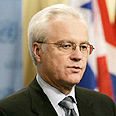
Vitaly Churkin
צילום: AFP
Russia warns Iran over nuclear program
Moscow may back further sanctions against Tehran unless it halts uranium enrichment in next few days, Russia's UN envoy says
MOSCOW - Russia warned Iran on Wednesday that it would back further United Nations sanctions over its nuclear program unless Tehran halted uranium enrichment in the next few days.
The United States, Britain and France are pushing to impose new punitive measures on Iran, which they suspect of seeking to acquire a nuclear weapon.
Russia's UN envoy Vitaly Churkin said Moscow could back a sanctions resolution the Western powers have drafted and which they are seeking to discuss in the Security Council this week.
"If Iran in the next few days does not stop the enrichment activities of its heavy water project then yes, Russia ... has taken upon itself certain commitments... to support the resolution that has been drafted in the past month," Churkin told reporters via a video link from New York.
The UN Security Council has demanded Iran halt uranium enrichment, the part of its nuclear program that most worries the West because the process can potentially be used to make material for bombs.
Iran has refused to halt the work. It says it is seeking to master nuclear technology so it can make fuel for a planned network of nuclear power plants and save its huge oil and gas reserves for export.
'Time is not unlimited'
France and Britain have submitted a third sanctions resolution against Iran calling for measures including asset freezes and mandatory travel bans for specific Iranian officials.
It also expands the list of Iranian officials and companies targeted by the sanctions. Earlier rounds of sanctions were imposed in December 2006 and March 2007.
Russia, which has increasing ties to Iran's energy industry, has previously been reluctant to impose more UN sanctions on Iran.
Major powers are also discussing possible new moves to draw Iran into negotiations over its nuclear program, EU foreign policy chief Javier Solana confirmed on Wednesday.
"It's been a debate of the political directors of the six countries," Solana told Reuters on the margins of a conference in Brussels, when asked about the possibility of new steps involving incentives to Tehran.
He was referring to the five major powers of the UN Security Council -- the United States, China, Russia, France and Britain -- plus Germany.Political directors from the six met in Washington on Monday when they agreed to move ahead soon on the additional sanctions.
US State Department spokesman Tom Casey said the political directors were examining how a 2006 incentives offer could be presented in a way Iran would find attractive.
That offer included talks with the United States on any subject if Tehran suspended uranium enrichment; airline parts for civilian planes and dropping objections to entry to the World Trade Organization.
Israeli Prime Minister Ehud Olmert said on Wednesday it was not inevitable that Iran would produce a nuclear bomb. Israel regards Iran's nuclear program as a threat to its existence.
"I think there is time," said Olmert, asked by reporters during a visit to Japan whether Iran could be stopped from achieving nuclear weapons capability.
"The time is not unlimited but it is defined by more than months," added Olmert, whose country is widely believed to have the only nuclear arsenal in the Middle East.










